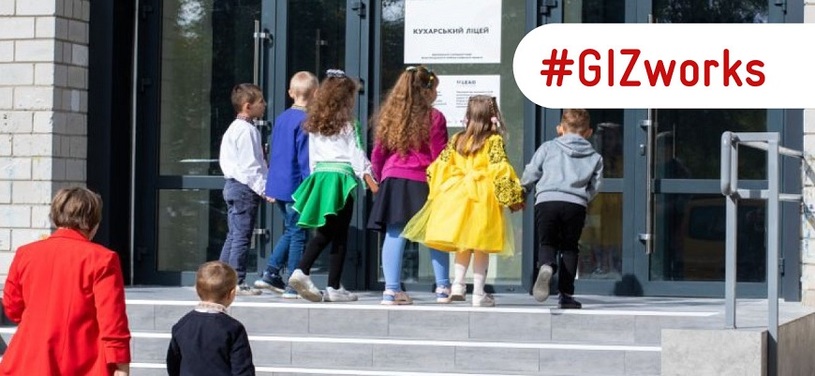
22.02.2024
Ukraine: Learning to rebuild and rebuilding to learn
GIZ works! Small communities are rebuilding their schools. New digital hubs ensure better online teaching – often from the school basement.
There is currently a lively debate taking place about the purpose of development cooperation and how it is implemented. In this series, GIZ showcases how it achieves results – in partner countries and in Germany’s interests.
Books, laptops, school furniture, a reliable internet connection... The sheltered basement of the secondary school in the northern Ukrainian municipality of Ripky has become a digital, safe place of learning in difficult times. In the new digital centre, teachers can safely teach or record lessons for their classes. For pupils, it is a place of retreat where lessons can continue to take place even under adverse conditions.
_________________________
GIZ is strengthening municipalities in Ukraine so that they can continue to take care of people locally, even during the crisis. For example, communities are rebuilding destroyed schools with minimal expense, and new digital centres are allowing classes to take place online. This means that thousands of children can continue school despite the war. Their families can remain in the municipalities or return to previously occupied areas. This is one of many ways that Germany is supporting Ukraine and stabilising the European neighbourhood.
_________________________
25 of these digital centres are being set up in four Ukrainian regions with the help of the Deutsche Gesellschaft für Internationale Zusammenarbeit (GIZ) GmbH and a local partner organisation. Around 15,000 children and young people can take part in online lessons via the centres. The German Federal Ministry for Economic Cooperation and Development (BMZ) has commissioned the centres, with the European Commission providing the financing.
They are enabling municipalities with up to 50,000 people to meet the basic need for education even during the crisis. The municipalities themselves know what they need: laptops and cameras for online lessons, school buses for safe transport or sheltered basements in existing school buildings. GIZ is taking care of procurement or organising the tenders.
New school for the autumn term
Many schools have been completely destroyed by the war. One of them is the Novyi Bykiv secondary school in the formerly occupied Chernihiv region. A teacher says: ‘The school was heavily damaged and had no windows. But the building was still standing, so we didn’t give up hope.’ Volunteers renovated and modernised the building in the middle of 2023 with the support of GIZ and a local organisation. The high school resumed operations just in time for the start of the autumn term.
A total of twelve schools in Ukraine were renovated in this way. Around 5,000 children and young people are receiving lessons again. This is very important for small, remote municipalities, because running schools keep people in the area or encourage them to return.